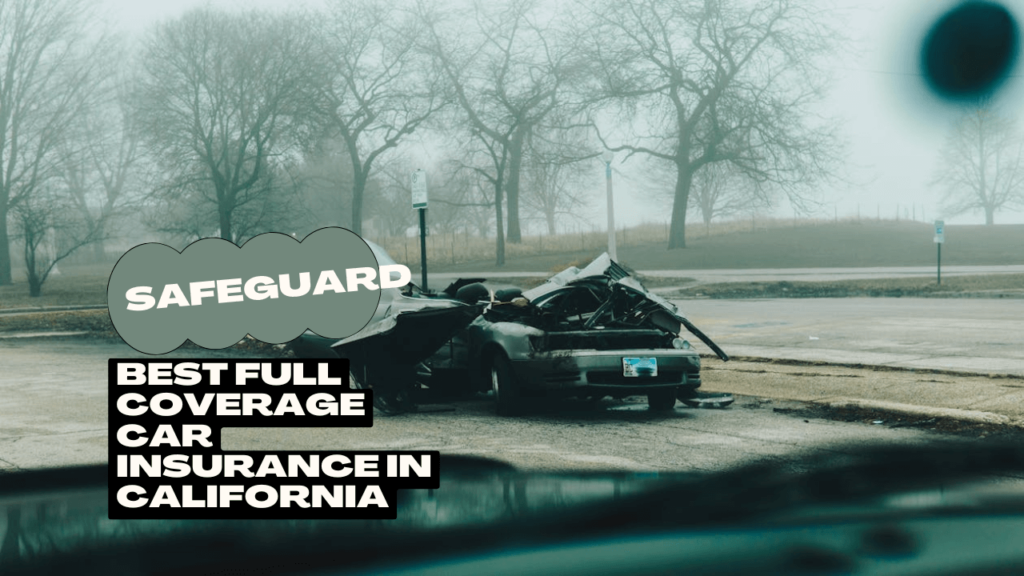Finding the right full coverage car insurance in California can be overwhelming, given the state’s diverse driving conditions and insurance options. Full coverage typically includes liability, collision, and comprehensive coverage, providing extensive protection for your vehicle and yourself. Here’s what you need to know to make an informed decision.

Understanding Full Coverage Car Insurance in California
Full coverage car insurance is not a specific type of policy but rather a combination of various coverage types designed to protect you in a wide range of scenarios. In California, full coverage generally includes:
- Liability Coverage: Covers bodily injury and property damage to others if you’re at fault in an accident.
- Collision Coverage: Pays for damages to your vehicle resulting from a collision, regardless of fault.
- Comprehensive Coverage: Covers non-collision-related damages, such as theft, vandalism, or natural disasters.
California’s Minimum Insurance Requirements
California law requires all drivers to carry minimum liability coverage:
- Bodily Injury Liability: $15,000 per person / $30,000 per accident
- Property Damage Liability: $5,000 per accident
However, these minimums are often insufficient, especially if you’re financing or leasing a vehicle.
Factors That Influence Full Coverage Car Insurance Rates in California
Several factors affect the cost of full coverage car insurance in California:
1. Driving History
Your driving record significantly impacts your premiums. A clean record will help you secure lower rates, while accidents, DUIs, or traffic violations can raise your costs.
2. Vehicle Type
The make, model, and year of your vehicle can influence insurance rates. Expensive cars or those with high repair costs typically come with higher premiums.
3. Location
California is known for its diverse regions, and insurance rates can vary greatly. Urban areas often face higher premiums due to increased traffic and accident rates, while rural areas may offer more affordable options.
4. Age and Gender
Younger drivers typically pay more for insurance due to their lack of experience. Additionally, statistics show that male drivers, particularly those under 25, often pay higher premiums than female drivers.
5. Credit Score
In California, insurers can use your credit score as a factor in determining your premium. A good credit score can help you secure lower rates.
Top Providers for Full Coverage Car Insurance in California
When looking for the best full coverage car insurance, consider these top providers known for their competitive rates and reliable service:
1. Geico
Geico is popular for its affordable rates and excellent customer service. They offer a variety of discounts, making it a great option for budget-conscious drivers.
2. State Farm
State Farm is known for its personalized service and comprehensive coverage options. Their extensive network of agents can help you find the right policy for your needs.
3. Progressive
Progressive offers a range of full coverage options and a unique Snapshot program, which allows safe drivers to earn discounts based on their driving habits.
4. Allstate
Allstate provides a variety of coverage options and discounts for bundling policies. Their extensive resources and tools help customers make informed decisions.
5. Farmers Insurance
Farmers offers customizable policies and a range of discounts. Their local agents are available to help you tailor your coverage to fit your needs.
Tips for Finding the Best Full Coverage Car Insurance in California
- Compare Quotes: Always shop around and compare quotes from multiple insurers to find the best rates for full coverage.
- Understand Your Coverage Needs: Assess your driving habits and the value of your vehicle to determine how much coverage you really need.
- Look for Discounts: Many insurers offer discounts for safe driving, bundling policies, or maintaining a good credit score.
- Review Your Policy Regularly: Life changes, such as moving or purchasing a new vehicle, can impact your coverage needs and premiums.
- Consider Usage-Based Insurance: If you drive infrequently, look into usage-based insurance options that could save you money based on your driving behavior.
Conclusion
Choosing the best full coverage car insurance in California involves evaluating your specific needs and comparing various providers. By understanding the factors that influence premiums and taking the time to shop around, you can find a policy that offers the protection you need at a competitive price.
FAQs
What does full coverage car insurance cover?
Full coverage typically includes liability, collision, and comprehensive coverage, protecting you against a variety of risks, including accidents, theft, and natural disasters.
Is full coverage car insurance mandatory in California?
While California requires minimum liability insurance, full coverage is not mandatory. However, if you have a financed or leased vehicle, your lender may require full coverage.
How can I lower my full coverage car insurance premium?
You can lower your premium by maintaining a clean driving record, comparing quotes, taking advantage of discounts, and improving your credit score.
